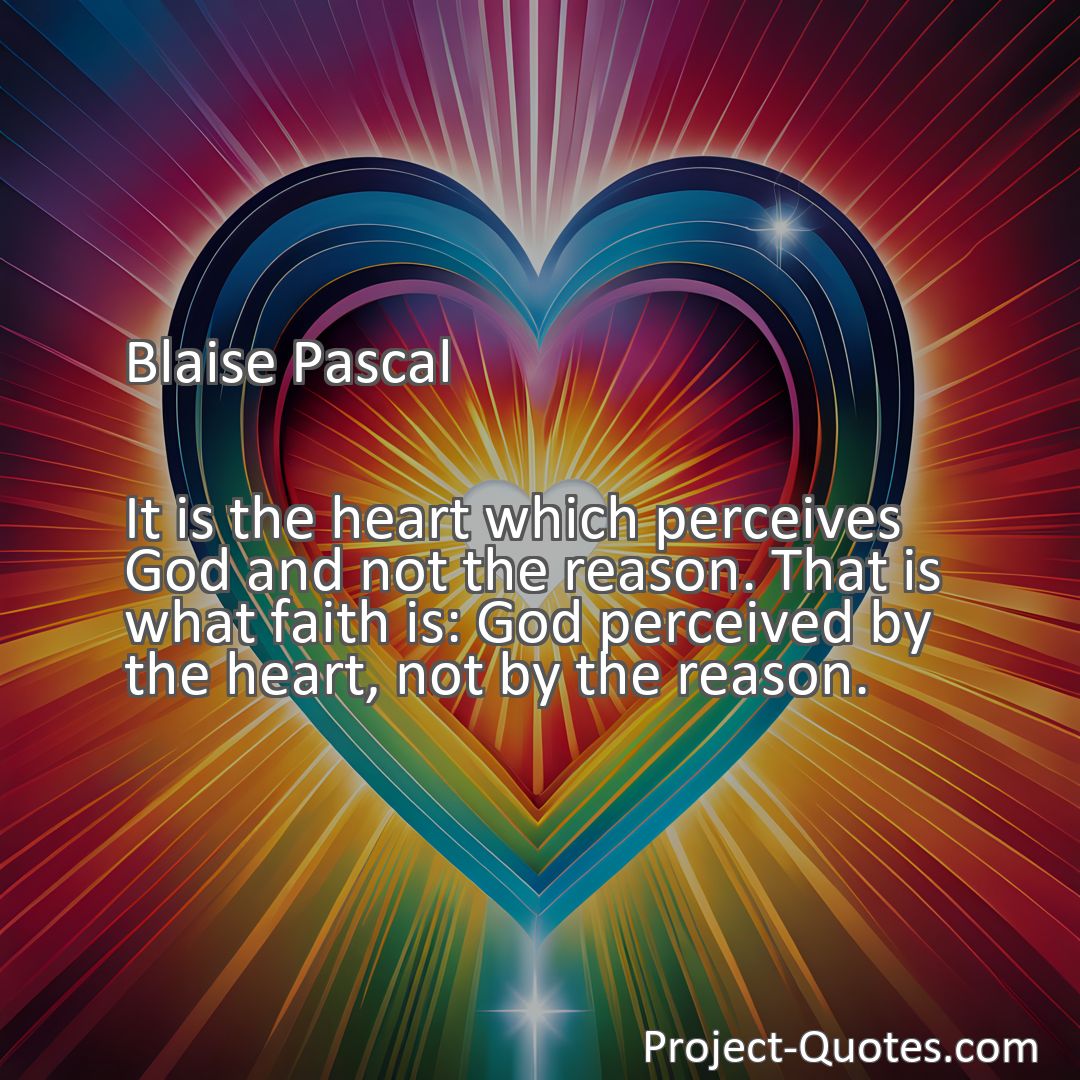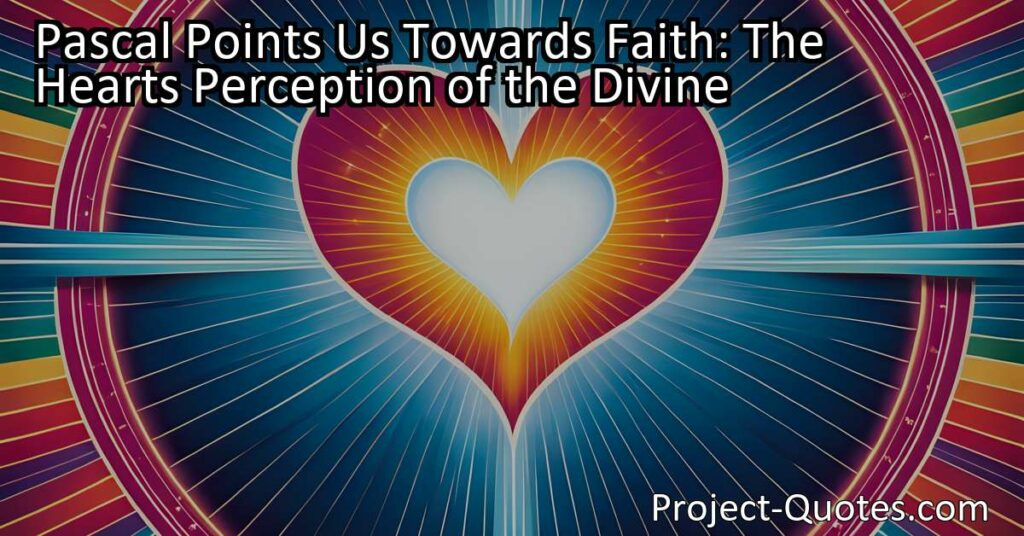It is the heart which perceives God and not the reason. That is what faith is: God perceived by the heart, not by the reason.
Blaise Pascal
Pascal Points Us Towards Faith: The Heart’s Perception of the Divine Pascal suggests that faith is the ability to perceive God with the heart, rather than relying solely on analytical thinking. He encourages us to go beyond our physical senses and tap into a deeper capacity for understanding and connecting with the divine. Pascal emphasizes the importance of a holistic approach that integrates both reason and faith, as they complement each other and enrich our spiritual journey.
Table of Contents
- 1 It is the heart which perceives God and not the reason. That is what faith is: God perceived by the heart, not by the reason.
- 2 Blaise Pascal
- 3 Meaning of Quote – It is the heart which perceives God and not the reason. That is what faith is: God perceived by the heart, not by the reason.
- 4 Freely Shareable Quote Image
- 5 Related
Meaning of Quote – It is the heart which perceives God and not the reason. That is what faith is: God perceived by the heart, not by the reason.
In the realm of faith and spirituality, there are certain aspects that transcend logical reasoning and intellectual understanding. One such aspect is the perception of God, which, according to Blaise Pascal, is not a product of reason but of the heart. In this quote, Pascal suggests that faith is the ability to perceive God with the heart, rather than relying solely on analytical thinking.
When we think of perceiving something, we often associate it with our physical senses. We perceive the world around us through sight, hearing, taste, touch, and smell. However, Pascal encourages us to go beyond these senses and tap into a different dimension of perception the heart. While the heart is commonly associated with emotions and feelings, Pascal suggests that it possesses a deeper capacity for understanding and connecting with the divine.
It is important to note that Pascal does not dismiss reason entirely. He acknowledges its role in our lives and recognizes that it can provide valuable insights and knowledge. However, when it comes to matters of faith, he argues that reason alone is not sufficient. For Pascal, true faith is not simply a product of logical deductions or intellectual debates, but a profound experience that goes beyond what the mind can comprehend.
One might wonder how the heart can perceive something intangible like God. After all, God is not a tangible entity that can be observed or measured. That is precisely the point Pascal is making. The perception of God is not something that can be grasped through empirical evidence or logical reasoning alone. It requires a different way of knowing an intuitive understanding that originates from the depths of our being.
When we think of the heart, we often associate it with qualities such as love, compassion, and empathy. These qualities are deeply connected to our spiritual nature and can serve as a gateway to perceiving the divine. It is through the heart that we experience emotions that are beyond rational explanation, such as awe, wonder, and a sense of spiritual connection. These emotions, according to Pascal, are the language of the heart, through which we can perceive God’s presence in our lives.
But how do we cultivate this ability to perceive God with the heart? Pascal points us towards faith as the key. Faith is often perceived as blind belief or adherence to a set of religious doctrines. However, Pascal’s understanding of faith goes deeper than a mere intellectual acceptance of religious teachings. It is an existential experience that enables us to be receptive to the divine presence and to make sense of the mysteries of life.
To have faith is to enter into a relationship with the unknown, to embrace uncertainty, and to trust in something greater than ourselves. It requires us to surrender the need for concrete proof and to open ourselves to the possibilities that lie beyond the boundaries of reason. Faith gives us the courage to embrace the paradoxes and contradictions of life, knowing that there is a deeper meaning and purpose beyond our limited understanding.
While reason seeks to analyze and dissect, faith invites us to surrender and trust. It is through this surrender that we allow the heart to take the lead and perceive the invisible threads that connect us to the divine. Just as a beautiful piece of music cannot be fully appreciated through analytical understanding alone but must be felt with the heart, the perception of God requires a similar receptive state of being.
One may argue that relying solely on the heart for perceiving God is subjective and prone to personal biases. After all, there are countless religious and spiritual beliefs in the world, each claiming to have a unique understanding of the divine. However, Pascal’s point is not to exclude reason or invalidate the experiences of others but rather to emphasize the importance of a holistic approach that integrates both reason and faith.
In this integrated approach, reason and faith complement each other, serving as two wings that enable us to soar into the realm of spirituality. Reason provides the framework and intellectual explorations, while faith brings depth, meaning, and purpose to our lives. Instead of seeing them as opposing forces, Pascal encourages us to see reason and faith as mutually enriching and harmonizing aspects of our spiritual journey.
In conclusion, Pascal’s statement that it is the heart which perceives God and not the reason encapsulates the essence of faith. It reminds us that there are dimensions of our existence that transcend logic and reason, and that perceiving the divine requires an openness of the heart. While reason has its place in our spiritual exploration, faith allows us to tap into a deeper level of understanding that cannot be reached through analytical thinking alone. Embracing this understanding not only enriches our spiritual lives but also encourages us to approach others with compassion and empathy, recognizing the beauty and diversity of human experiences in their quest for truth and connection with the divine.
I hope this quote inspired image brings you hope and peace. Share it with someone who needs it today!


